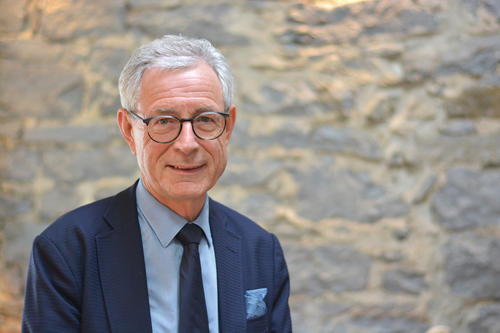Creating an Academic Bridge between Berlin and Oxford
Alastair Buchan, a member of the Oversight Committee of the Oxford-Berlin partnership, commented on the promising partnership.
Apr 29, 2019
A city landmark of the University of Oxford in England from the early 20th century: Hertford Bridge, commonly known as the “Bridge of Sighs.”
Image Credit: Michael Beckwith / Pixabay
Oxford University is delighted to be collaborating with the Berlin University Alliance. The Alliance not only brings together the individual strengths of the four institutions, Freie Universität Berlin, Humboldt-Universität zu Berlin, Technische Universität Berlin, and Charité –Universitätsmedizin Berlin, it also maximizes these very powerful institutions’ multidisciplinary prowess in the Arts and Humanities, in Social Sciences, in Mathematics, Life and Physical Sciences, Engineering, and in Medicine and Health.
“The collaboration seeks to overcome the risk of an Anglo-German divide resulting from Brexit.”
The collaboration seeks to work across institutional boundaries in Berlin and thus overcome the risk of an Anglo-German divide resulting from Brexit. It is based on a bottom up approach, which focuses on research collaboration, the shared use of collections, and encouraging the movement of scholars and researchers.
As Berlin develops as the Brain City, a bridge between Oxford and Berlin, which links and unites the participating universities will surely facilitate the free movement of scholars and ideas. For Oxford, this international partnership relates not only to its multidisciplinary character, but also to the excellence of the research undertaken. Additionally, intergenerational opportunities t hat facilitate new recruitment and platforms for technology will be essential.
The partnership will foster newly developed platforms for robotics, artificial intelligence, imaging, molecular biology, epidemiology and the handling of large data sets. It will furthermore enable increased access to collections – either historical in libraries and museums, in which both Berlin and Oxford are very rich, or in data and in clinical repositories. The University of Oxford has points of contact with the Berlin partners in numerous areas, the synergy between the five institutions having been initially developed via over twenty workshops with another eight planned across the disciplines.
The partnership will enjoy further development as a result of the recently held competition for “seed” funding, in topics ranging from enlightenment studies, to the digital gig economy, to the neuroscience of dementia, to problem-solving in parrots and robots which has huge potential for developing artificial intelligence. It is intended that the twenty-nine successful applications for seed funding will now lead to sustainable partnerships, capable of winning further international third party funding from both UK and German funding agencies, as well as European and international organizations.
Ultimately, the hope is that we will develop both a hub in Oxford centered around a Berliner Haus, as well as an Oxford Centre in Berlin that will allow us to maintain close contact with our Berlin partners. Such close collaboration is essential in order to secure traditional academic freedoms including the movement of students, scholars and ideas as well as access to resources, collections and funding.
This is vital in an age in which academic networks are increasingly threatened by political events such as the impending Brexit. Partnering across national borders and engaging with public forums will help us protect all that is most dear to academic hearts. On the wall inside the Cohen Quad, a new student residential hub at Exeter College (one of Oxford’s most ancient colleges), a donor recognition panel states that “Michael and Sonia Cohen knew that education is the one possession that cannot be taken away from you.”
“Preserving the Humboldtian model: providing the very best education, delivered by inspiring researchers.”
Of course, universities have to adapt to changing times and circumstances but the Humboldtian model to which we have aspired for almost two centuries, namely that of providing the very best education, delivered by inspiring researchers, is surely one that is absolutely worth preserving.
The Oxford Berlin Collaboration is dedicated to achieving this via the partnership of two world class centres of scholarship, learning and culture. And, as Goethe might say, it is one that rises above national boundaries in an attempt to reduce the current political risks that potentially threaten the future of world-wide academia as we know it.
—The author is a Professor of Stroke Medicine and Pro-Vice-Chancellor at the University of Oxford and a member of the Oversight Committee of the Oxford-Berlin partnership.
This text originally appeared on February 22, 2019, in a Tagesspiegel newspaper supplement published by Freie Universität Berlin, Humboldt-Universität zu Berlin, Technische Unversität Berlin, and Charité - Universitätsmedizin Berlin.
Further Information
The University of Oxford and the Berlin University Alliance decided to establish a strategic partnership in 2017. In 2018, all five institutions approved start-up funding for 29 research projects in which scholars and scientists from Berlin and Oxford jointly pursue research issues. Funding is provided for projects in the humanities, social sciences, medicine, and natural sciences. In this way, the partners deepen their existing research relationships and strengthen new forms of research cooperation that do not stop at institutional or national borders.
- Second Call for Seed Funding Proposals: deadline for submitting proposals is 27 June, 2019


